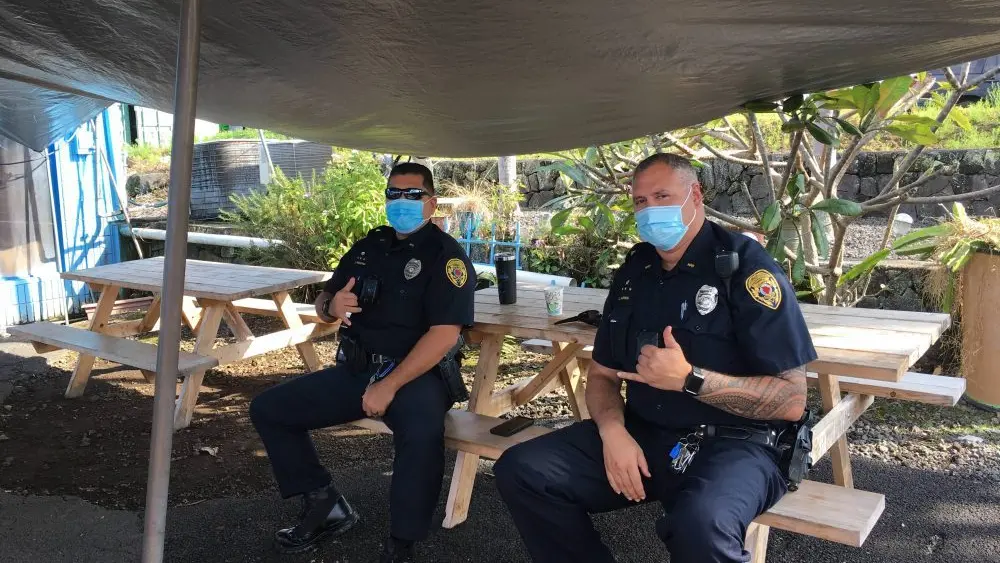(AP) – Hawaii lawmakers have earmarked nearly $400 million for housing subsidies and public housing developments over the next two years to try to make a dent in the increasingly desperate statewide need for affordable housing.
That sizable sum includes $37 million for Gov. Josh Green’s signature kauhale program to provide tiny homes and other housing options for homeless people, and $68 million for the planned Ka Lei Momi initiative to to provide 10,000 new units by redeveloping state properties.
A total of $240 million would be committed to the Rental Housing Revolving Fund and the Dwelling Unit Revolving Fund, which are both used to subsidize housing projects.
That funding is part of a new state construction budget for the next two years totaling more than $7.4 billion in state, federal and other funds. House and Senate lawmakers gave preliminary approval to that spending package Monday evening.
The House Finance Committee and Senate Ways and Means Committee also approved a $19.9 billion operating budget for the fiscal year that begins July 1, and a $19.76 billion budget for the following year.
That is somewhat less than the nearly $41 billion operating budget Green proposed for the next two years, but lawmakers will continue to negotiate this week over separate spending bills that could significantly boost their proposed spending totals.
Friday is the deadline for all bills to be in their final form and positioned for final votes in the House and Senate.
Last fall Green said he was confident the state could set aside hundreds of millions of dollars to resolve claims growing out of the deadly Lahaina wildfire, and also pay for negotiated raises for thousands of unionized public workers whose contracts expire this year.
Those plans still appear to be on track, but the financial outlook for the state has changed with alarming speed since then. It now appears the state budget may take a painful, unexpected hit from federal budget cuts imposed by President Donald Trump and Republicans in Congress.
The budget Green proposed in December assumed the state Department of Human Services would receive about $3 billion each year over the next two years in federal money, including funding for Medicaid and the Supplemental Nutrition Assistance Program, formerly known as food stamps.
Those programs, which provide health care and food assistance to Hawaiʻi’s poorest residents, have become targets for federal cuts. If the federal government shreds the funding for those programs, many Hawaiʻi lawmakers want to step in to provide state dollars as a backstop. Lawmakers have said they’re prepared to return to the Capitol for special sessions later this year if necessary.
Trump’s huge tariffs have added to the anxiety, with state experts fretting about the declining stock market and the possibility that a national recession may follow. If that happens, economists worry the state’s all-important visitor industry could take a dive and drag state tax collections down with it.
Coping With The Lahaina Disaster
Still, Green’s plan to contribute more than $800 million to the wildfire trust fund to resolve claims growing out of the deadly Lahaina fire appears to be on track.
Lawmakers are expected to finalize House Bill 1001 Tuesday afternoon to fund the state’s contribution to the $4 billion wildfire trust fund, with the state expected to contribute $400 million in the fiscal year that begins July 1, and $407 million the following year.
That money would be the state’s share of a global settlement fund intended to resolve hundreds of lawsuits related to the fire, which killed 102 people and destroyed more than 2,200 structures. Maui County, Hawaiian Electric Co., Hawaiian Telcom and Kamehameha Schools have also agreed to contribute to the fund.
Lawmakers are also advancing an appropriations bill that includes almost $50 million to fund raises for University of Hawaiʻi and community college union faculty.
The University of Hawaiʻi Professional Assembly struck a deal with the Green administration last fall for raises of 3.5% next fiscal year, and 3.79% the following year.
The United Public Workers union is trying to finalize separate deals this week for similar raises under a four-year contract, which would then need to be rushed through the Legislature later this week in order to be funded. UPW represents blue-collar state and county workers and state corrections officers.
But the alarming budget scenario has made lawmakers cautious about any new and potentially pricey social services initiatives.
Among the proposals that didn’t make it this year was a bill to increase the state tax credit for families that pay for child or adult care expenses.
Bills to require paid family leave for people caring for newborns or family members with serious health conditions also failed to pass. However, House and Senate lawmakers did vote to establish a working group to further study that idea, which has been debated time and again at the Legislature.
Still hanging in the balance this week is a bill to to make free and reduced price lunches available to more public school students. If it passes, Senate Bill 1300 would make free lunches available starting next year to students whose family income is 300% of the federal poverty level or less.
Also still alive is House Bill 692 to expand access for children to the preschool Open Doors program. That measure is designed to remove barriers to enrollment in Open Doors, which offers subsidies to parents to make preschool more affordable.
House and Senate negotiators announced Monday that they have earmarked $30 million to continue planning and procurement to hire a developer to build a new Oʻahu jail, and also set aside $4 million to provide resources to help former inmates make the transition back into society after they are released.
Director of Corrections and Rehabilitation Tommy Johnson has said he plans to use that money to provide wrap-around re-entry services for prisoners as they leave the system, including hiring “navigators” to help connect the former inmates with community services, benefits and housing.
The House and Senate also reached agreement on a $3 million general fund appropriation for the Office of Hawaiian Affairs in each of the next two years.
The amount is far less than what OHA officials had hoped for at the start of session. The office initially requested an additional $1.2 million to create 13 new positions aimed at improving health, education, economic and housing outcomes for Native Hawaiians.
The House agreed to those additional positions but the Senate declined to fund them. In the end, the House and Senate money committees approved a budget that keeps OHA’s general fund revenues flat.
“It’s not what I preferred but this is what they determined,” Rep. David Tarnas, chairman of the House Judiciary and Hawaiian Affairs Committee, said during a hearing on OHA’s budget early Monday.
OHA has a total annual operating budget of about $45 million, of which $3 million comes from the state’s general fund. The majority of the budget comes from the Native Hawaiian Trust Fund, revenues from public lands and revenues from OHA’s commercial properties.
Lawmakers also approved the Judiciary’s budget of more than $173 million in general funds for each of the next two years.
That includes $2 million in pay increases for judges and court staff for the fiscal year that begins July 1. However, lawmakers did not reach an agreement on pay increases for the following year.
The judiciary budget also includes $1 million for civil legal services for federal court proceedings and $750,000 for legal services for immigrants in each of the next two years.
Lawmakers are also putting $4 million in bond funds toward a new district courthouse in South Kohala on the Big Island.
Story originally published by Honolulu Civil Beat and distributed through a partnership with The Associated Press.
AP Photo




